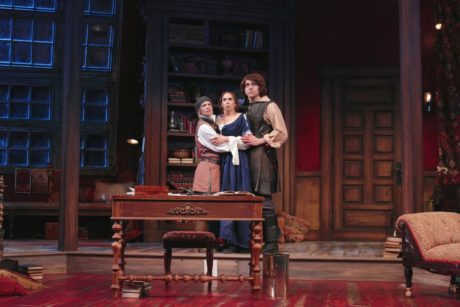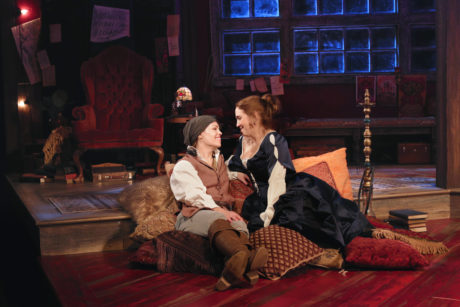First of all, for theatre lovers, there is nothing as delightful as watching three top notch actors have fun on stage, and with Holly Twyford, Gregory Linington, and Erin Weaver you’ll see three of the best this area has to offer having a fantastic time.

Second of all, for those who don’t know theatre history, the play’s protagonist is the historical theatre figure, Aphra Behn (Holly Twyford), one of the first female authors to make her living as a writer.
But don’t expect Or, to be weighted down with historicity. For it most definitely is not a historical bio-play.
Rather, Liz Duffy Adams’s Or, might best be described as a feminist historical fantasy play in texture while, in style, a sex farce for the sexually fluid. It’s as light as an erotic dream can be: pleasure without the strings, or the syphilis, which was then spreading through Europe like the plague.
Taking place at the end of the Interregnum (that short period [1649-1660] between Charles I and Charles II when various forms of republican governments ruled over England) Or, offers a cheery picture of monarchy’s return.
For, during those 11 years, theatre and gambling had been banned by Puritan politicians while egalitarianism was being promoted by the Levelers). With the return of the Stuarts and the beginning of the Restoration, however, theatre came back with a vengeance, while the Levelers found the gallows.
When theatre returned, it opened its door to women: two of whom were the aforementioned novelist and playwright Aphra Behn and a leading actress of the day, Nell Gwynne (Erin Weaver).
Playwright Adams builds Or, around that simple fact: fun and technically sophisticated, Or, is built to delight theatre lovers everywhere.
As it turns out, Charles II (Gregory Linington) was quite the theatre lover, as well as quite the lady’s man. In fact, he even took an actress as one of his mistresses: none other than Nell Gwynne, who produced 2 of Charles’ 15 illegitimate children.
Upon his death, Charles II left no legitimate heirs, but he took care of his mistresses, including Nell, leaving them grand estates while many of his illegitimate children became Earls and Dukes.
Gwynne’s son Charles became the Duke of St. Albans.
Needless to say, the commoners resented having to pay for such magnanimity with increased taxes.

Both Behn and Gwynne have had quite a bit of scholarly and artistic work done on their lives and their contributions to the advancements of women in the theatrical arts.
In recent years, Gwynne, in particular, has had a play, Nell Gwynn, by British playwright Jessica Swale, and a one-woman show by Bella Merlin, A Dramatick Essaye on Acting and Prostitution.
Now, as for the title, Or, (yes, that’s with the comma) don’t expect an “either”, as in “Either/Or,” as in the first work of Sɵren Kierkegaard, as in the 19th century Danish philosopher who found himself stuck between a life of aesthetic, spiritual fulfillment and a life of nitty-gritty family, children, and middle-class routine: hence, the binary choice.
Or, espouses a guilt-free, no consequence life of pleasure, where one can have it all. Of course, kings have that option more easily than the commoners who support them.
Charles II, nicknamed Old Rowley (after his horse, a famous stallion), even found a way to avoid an afterlife of consequence: on his deathbed, he was admitted back into the Catholic Church.
He was buried in Westminster Abbey “without any manner of pomp.”
As was Aphra Behn, in the East Cloister. Her tombstone reads:
“Here lies a Proof that Wit can never be Defence enough against Mortality.”
As for Nell Gwynne, she died from syphilis and is buried in the Church of St Martin-in-the-Fields. In her will, she left her legacy to the Newgate prisoners in London.
Which is fitting. For a woman born into the lowly class of beggars and prostitutes and forced to endure (however skillfully) the vagaries of royal blood in a theatre resurrected to glorify the King and his clan, Nell never forgot the folks she came from.
Running Time: 90 minutes, with no intermission.
OR, plays through May 7, 2017, at Round House Theatre – 4545 East-West Highway, in Bethesda, MD. For tickets, call the box office at (240) 644-1100, or purchase them online.





